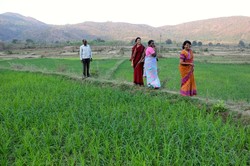Presbyterian Hunger Program Associate Andrew Kang Bartlett has a passion for organic, natural foods and for sustainable food production. In his 14 years with the Presbyterian Church (U.S.A.), he has worked with farmers, farmworkers, and ecumenical partners across the world to ensure they have the resources they need to grow food naturally, without the invasion of chemicals and corporate interference.
Kang Bartlett recently spent eight weeks crisscrossing India and Sri Lanka to see firsthand how people are struggling to grow food organically and protect the land. In the midst of their efforts, farmers are trying to stave off outside interference from agri-businesses that are trying to convert India’s agriculture into large-scale industrial production using proprietary seeds and chemicals.
“Part of the eight weeks were spent meeting Presbyterian Hunger Program Joining Hands partners and learning about their efforts to strengthen food sovereignty,” says Kang Bartlett. “Another part was to immerse myself in this ancient/modern, spiritual/material land to learn how people navigate a rapidly changing world and stay healthy.”
Millet, sorghum, and many varieties of rice make up the traditional grains in the region. Farmers would traditionally use the seeds from their crops for the next season’s planting. But that changed when agribusinesses came in with hybrid and genetically-engineered seeds, fertilizers, and pesticides. With the financial muscle to back them up, companies could negotiate arrangements that were beneficial to their bottom line, forcing farming communities to use their products.
“The farmers have no control over these new products because they can’t save and replant the seeds. They have to buy new seeds every year,” says Kang Bartlett. “Over time, the costs of the seeds and the chemicals they require have become so great that farmers have gone bankrupt by the millions.”
Kang Bartlett says more than a quarter-million farmers in India have committed suicide over the past 20 years because of their losses. Farming is difficult enough, he says, without being intensified by the mounting debt. During his many weeks in the region, Kang Bartlett met with groups of farmers who had strong opinions about the outside corporate involvement with their livelihood.
Farmers’ groups fear the increased buying power of large retailers will further weaken farmers’ efforts and lead to the eventual destruction of diversity in Indian agriculture.
Pochamma is from the village of Sikanlapur in Telangana, India. She is the leader of the Dalit Mahila Association, an organization committed to protecting the rights of small farmers, especially women. “We are fighting for our farms because food cultivation is important to us. Due to usage of chemicals, we have had health issues and the uteruses of our women have been harmed. We want to cultivate organically and hope to achieve this. We don’t want new seeds. We want to farm using our own seeds.”
Another Dalit farmer, Nasumu, made it clear that giant agri-food companies need to go. “It is not good for our health. Using our own seeds and methods, we are raising good and healthy food. Why should we use their seeds and fertilizer to raise crops? We don’t want cash crops, we want food crops.”
Kang Bartlett says the hybrid seeds from agribusinesses for some crops, such as cotton, have often resulted in higher initial productivity for farmers. However, farmers report productivity drops off after two or three seasons.
“Hybrid seeds are less resilient when it comes to climate,” he says. “If the weather is right and the amount of rain is good, the crops will do well. But with unpredictable weather and changing climate, that is not guaranteed.”
To learn more about the agriculture, seeds, and land of India, a PHP Joining Hands partner has produced a video: Snakes and Ladders: Small Farmers and Seed Sovereignty in India.

